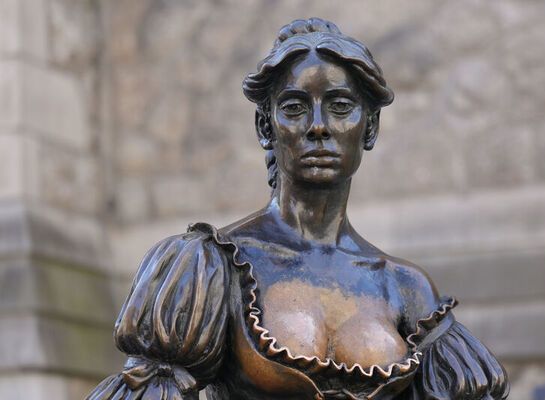[caption id="attachment_71086" align="aligncenter" width="600" caption="Katie Taylor celebrated victory over Queen Underwood in an Ireland vs. USA match in 2009. "]
In that wonderfully Irish way, we have been counting the days until Katie Taylor goes to London, puts her on gloves and wins a gold medal in the women’s boxing. Since the day in 2009 that it was announced the Olympics were going to allow distaff bouts into their shindig for the first time this summer, it has been assumed Taylor, the acknowledged pre-eminent female fighter of her generation, will beat all-comers in the lightweight category.
While Taylor herself has remained humble and modest about her chances, the rest of us have got a little carried away from time to time. Could you blame us? How often is an Irish competitor the favorite to win out on the world stage in anything? Of course, the 25 year old from Bray knows more about the sport than us glory-hunting bandwagon jumpers. She knows she will have to fight real opponents with genuine pedigrees.
In this respect, Queen Underwood is the American boxer reckoned by most observers to be the fighter most likely to stop Taylor’s quest for lightweight gold. The 27-year-old may not yet have formally secured qualification for the Olympics but she is already trailing all the accoutrements of a superstar. Underwood has her own website, her own charitable foundation and not one, not two, but five nicknames. Depending on the mood, she can be “Queen of the Ring”, “Seattle’s Own”, “The Mocha Mayhem”, “The Can’t Stop, Won’t Stop”, and “The Central District Diva.”
Watching her clock up more talk show miles than any other American Olympian so far this year, popping up everywhere from Anderson Cooper’s daytime show to the female-oriented gabfest, “The View,” it might be glib to point out the only thing left for Underwood to do is actually fly to England and collect her title. But her life is a little more complicated than that. In many ways here is a fighter whose journey is as important as her destination.
“I learned about responsibility, pain, and suffering, and I started to dream,” wrote Underwood in the manifesto on her website. “I’ve had challenging fights where I didn’t get the decision. I’ve had things in life that have knocked me down or tried to hold me back. Instead of giving in, I insisted on coming back stronger, making changes for the better.”
The pain and suffering she alludes to were far removed from the travails of the sporting arena. Her parents met in Seattle, Wash., when her father Azzad was 21 and her mother Alonna was 14. That was the age she gave birth to Underwood’s older sister Hazzauna. Two years later, Queen was born. After her parents split, the girls moved to South Carolina to live with their father and his new wife. There, Azzad Underwood began creeping into his daughters’ bedroom at night to molest them, the abuse starting with the eldest first,
“When Hazzauna would get dragged out of the room, I'd get up, go to the bathroom, flush the toilet, make noise, knock on doors, ask where's she's at," said Underwood in an interview with the Seattle Times last month. "He'd make her tell me, 'Go to sleep. Everything's O.K.'."
Soon, he started subjecting his younger daughter to the same horrors, always careful to do so when nobody else was home. Although Queen thought of getting a weapon and taking the law into her own hands, the abuse ended when the two sisters finally talked to each other openly about what was happening and contacted their mother. Their father was sentenced to seven years in jail and the kids ended up back in Seattle, where Queen, a promising runner and basketballer in high school, turned down college scholarship opportunities as she battled depression and other demons.
After school, she drifted, smoking too much weed, and struggling to find any direction until one fateful day a friend directed her to Cappy’s Boxing Gym in Seattle’s Central District. All she knew about the sport was one of her uncles used to box, she possessed the athletic ability to adapt to any sport and she had the toughness to take a punch. At 19, she discovered the vocation that would suddenly change the direction of her life.
“I feel a lot of people, when they start boxing, they really don’t know what they want to do or who they want to be or whether they just want to get in shape,” says Underwood. “But I honestly didn’t take on this sport to get in shape; I already knew I wanted to be a famous boxer. It takes a desire to want that. But there is a great reward when you set goals for yourself and you don’t give up. I don’t take too easy to giving up.”
Not that there weren’t bumps on the road. At her first U.S. Nationals in 2006, Underwood didn’t get past the first fight. Thereafter, she rededicated herself, giving up her day job as a pipefitter so she could train and turning into the formidable opponent who fought back from 10-2 down after the first two rounds against Taylor in the 2010 World Championships semi-final before finally losing by just 18-16. It was the type of performance many felt offered evidence Underwood might actually be able to defeat the Bray woman down the road.
“It's not really about what happened and went on then, it's what I am doing now,” said Underwood, talking about how she didn’t want her abuse to define her. “It's how I'm adjusting. Just to know that all types of abuse that I've been through and to be a five-time national champion, five years in a row ... I just don't want everything to be all about the bad part. It's good for me to finally get it out there. My wish: when your young ones hear of Queen Underwood they’ll be able to look up to me as I once looked up to my role models and say... ‘I can.’”
She can. Only Katie Taylor can decide whether she will.








